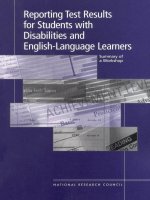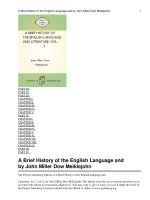British study english language
Bạn đang xem bản rút gọn của tài liệu. Xem và tải ngay bản đầy đủ của tài liệu tại đây (195.63 KB, 8 trang )
THE ENGLISH LANGUAGE
Germanic language is the basic of English
language.
- The history of the English language started with the
arrival of three German in the 5th century AD.
- At that time the inhabitants of Britain spoke a Celtic
language.
- The Angles came from "Englaland" [sic] and their
language was called "Englisc" - from which the
words "England" and "English" are derived.
Germanic invaders entered Britain on the east and south coasts in the 5th
century.
The development of the English language: Old
English (449-1100), Middle English (1100-
1450), and Modern English (1450-Present).
Old English (450-1100
AD)
Old English did not
sound or look like English
today.
Old English was spoken
until around 1100.
Part of Beowulf, a poem written in Old English.
Middle English (1100-1500)
•
Under Norman rule, French was the language
of the ruling class in Britain.
•
French became the language of the Royal
Court, and the ruling and business classes.
•
In the 14th century English became dominant
in Britain again, but with many French words
added. This language is called Middle English.
An example of Middle English by Chaucer.
Modern English
Early Modern English (1500-1800)
•
Towards the end of Middle English, a sudden and
distinct change in pronunciation (the Great
Vowel Shift) started, with vowels being
pronounced shorter and shorter. From the 16th
century the British had contact with many
peoples from around the world.
•
Many new words and phrases entered the
language in the Renaissance of Classical learning.
•
In 1604 the first English dictionary was published.
Hamlet's famous "To be, or not to be" lines, written in Early Modern English by
Shakespeare.









